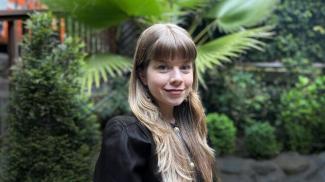
Register now!
Severe storms, flooding, melting glaciers, extreme heat, droughts, wildfires—it can be overwhelming. The realities of climate change are causing distress, anger, and other negative emotions in children and young people worldwide. A 2021 survey conducted by Elizabeth Marks and Caroline Hickman at the University of Bath of 10,000 16- to 25-year-olds from ten different countries found that most respondents were concerned about climate change and government responses to it, with nearly 60% saying they felt ‘very worried’ or ‘extremely worried’. Many associated negative emotions with climate change—the most commonly identified feelings were ‘sad’, ‘afraid’, ‘anxious’, ‘angry’, and ‘powerless’. This ‘eco-anxiety’ has a negative impact on respondents’ daily lives, say the researchers, and is partly caused by the feeling that governments aren’t doing enough to avoid a climate catastrophe.
Author and researcher Britt Wray will share practical tips and strategies for productively dealing with our emotions, living with climate trauma, and strengthening our communities so we can combat climate change together in her talk “How to Cope with Climate Anxiety: Saving the Earth and Saving Ourselves” on Wednesday, March 8, 2023 at 5:30 p.m. in EMU Redwood Auditorium as the Oregon Humanities Center’s 2022–23 Kritikos Lecturer. Wray demonstrates the emotional and existential effects of living in a warming world—and how we can get through them together. Although anxieties surrounding the climate crisis can cause us to burn out, give up, and question deeply personal decisions like whether to have children, working through these anxieties can unlock a deep capacity to care for and act on climate issues. According to Wray, we need to look at the climate crisis as a whole—not just the political or technological issues, but the mental health consequences as well. These effects can be severe, even leading people affected by climate events to experience PTSD and a loss of identity.
Britt Wray is a Human and Planetary Health Postdoctoral Fellow at the Stanford Center for Innovation in Global Health, Stanford Woods Institute for the Environment and London School of Hygiene & Tropical Medicine Centre on Climate Change and Planetary Health. Her research focuses on the mental health impacts of the ecological crisis. She is the creator of the weekly newsletter about “staying sane in the climate crisis” Gen Dread (gendread.substack.com) and author of Generation Dread: Finding Purpose in an Age of Climate Crisis (Knopf, 2022). Her first book is Rise of the Necrofauna: The Science, Ethics and Risks of De-Extinction (Greystone Books, 2017). She has hosted several podcasts, radio and TV programs with the BBC and CBC, and is a TED speaker.
Wray’s talk, part of the 2022–23 Belonging series, is free and open to the public. It will be livestreamed and ASL interpreted. Register.

